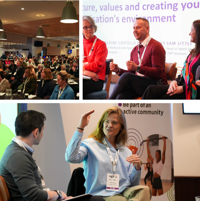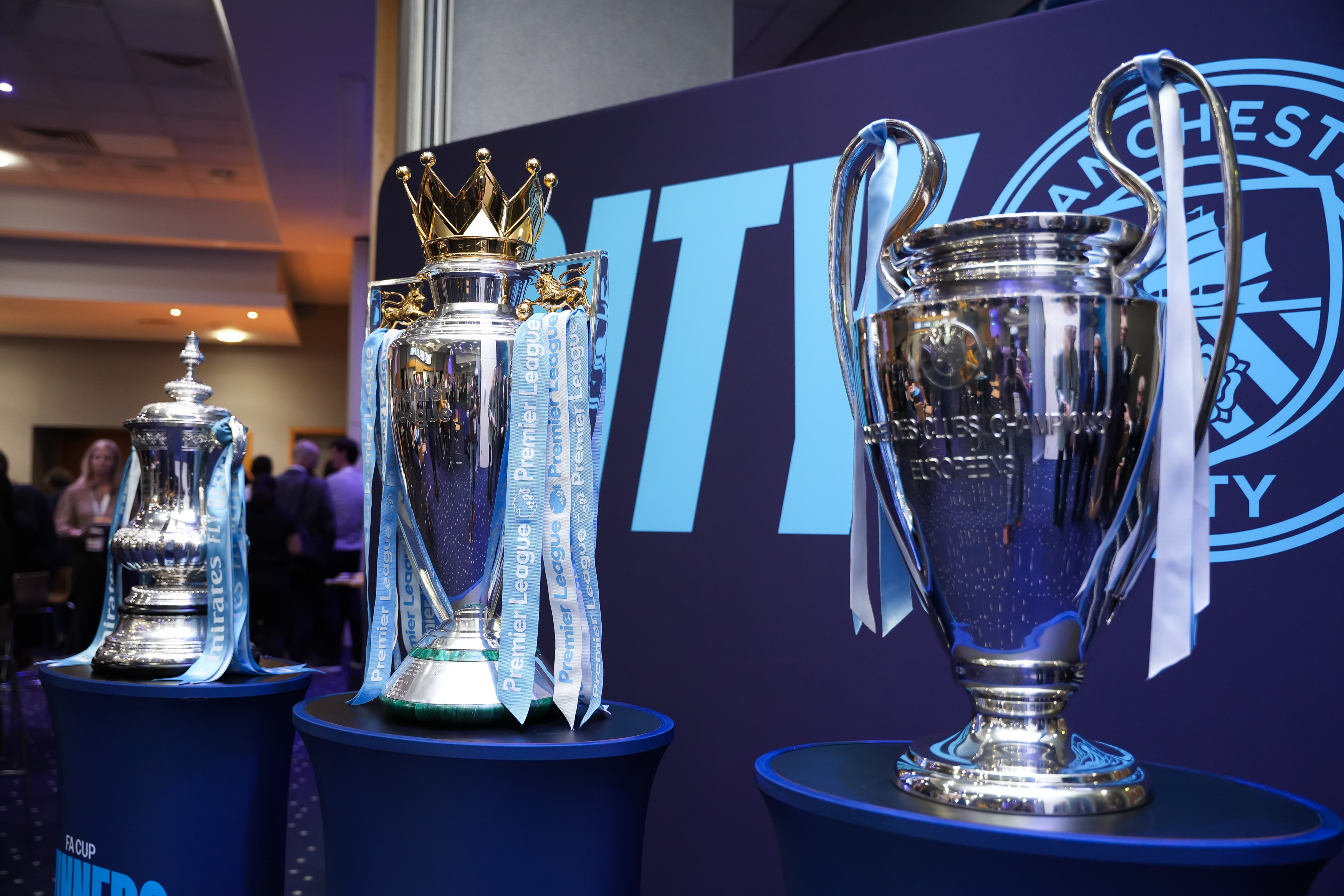
Future-Fit Governance - conference recap
Date: 20th Nov 2023
This year, the SGA Annual Conference made its way to the Etihad Stadium, home of Manchester City, for a day of insightful sessions, networking and learning – as well as some rather shiny trophies.
First half
The day kicked off with an introduction to the theme of the conference, Future-Fit Governance, before an address by the Minister for Sport, Stuart Andrew MP. The address highlighted the importance of governance and culture for creating a safe environment, encouraged people to speak up when things aren’t right, and placed inclusion at the very heart of what sports organisations work to achieve. It’s a familiar mantra, but one that should not be taken for granted: sport is for all.
The first panel session of the day was on culture and values, which included one of the clearest definitions of culture we’ve heard: “People like us do things like this”. This, of course, can be healthy or unhealthy, and Perrin Carrey, Founder of CoSteer, explored how deeply intertwined culture is with governance. Geraldine Costello looked at the difference between taking reactive or proactive approaches to cultural change, based on her experience at British Gymnastics. Sam Little from CMP Resolutions emphasised ‘clean air culture’, in which honesty and psychological safety are embedded, so that individuals and teams can feel comfortable taking risks and performing to the best of their ability.
Next up was a powerful conversation with Caragh McMurtry, former Olympic rower and the Founder and Director of Neurodiverse Sport, about neurodiversity and neuroinclusion. Caragh recounted her own experience as a woman with autism at the most elite levels of sport, facing tough expectations as well as physical and emotional duress. Her own strength of character and ability to advocate for herself, combined with people-centred leadership within the team, meant that she was more able to be herself and make significant performance improvements – shaving 17 seconds off her time – once a handful of reasonable adjustments had been made. To enable this, the team culture first had to shift to one which was open to hearing about differences, and serious about taking concrete action to address individuals’ needs. The session was a compelling argument for the creation of welcoming and inclusive environments as well as hard-hitting testimony of the obstacles faced by those with neurodivergent conditions.
Just before half-time (oh sorry, do we mean lunch?), came a panel on ESG and environmental sustainability. This addressed not only the largest organisations, but also sought to set out some practical steps which apply to local or smaller sports organisations. Denise Ludlam from Sport England in particular set out some straightforward (and free!) means of reducing our environmental footprint, such as sourcing electricity from a renewable supplier. The business case for taking environmental action – and the risks of not doing so – were covered by Deloitte’s Tom Hammond. Eve Joseph from British Triathlon talked through the steps that BT has taken to create an ESG strategy, and turn that into real-world impact. Action has never been so urgent; as highlighted by the panel’s chair, Emily Ford from CGI, the impact of climate change on sport is very real, and is only going to grow.
Over a delicious lunch, delegates got to chat to friendly faces, old and new, as well as a range of exhibitors. This year, we had gamified the conference app, and those who had interacted with it most often during the morning’s session got their reward: a stadium tour. There was another football fix on hand for all, in the form of Manchester City’s FA Cup, Premier League and Champions League trophies, available for photo opportunities.

Second half
The afternoon sessions kicked off with the topic of bystander intervention. Expertly introduced by Dr Rachel Fenton and Dr Nathan Eisenstadt, both of Kindling Interventions, bystander intervention aims to change our behaviours when confronted by challenging or unsafe situations in our clubs, organisations and communities. In a world where 71% of women have experienced sexual harassment, bystander intervention takes us through a series of stages to take action. It covers four stages of intervention, and four stages of challenge, and aims to give people the toolkit to safely intervene. Rachel and Nathan have identified a three-pronged approach: expressing disagreement with the wrongdoer, offering support to the victim, and enlisting an ally. The session also looked at how casual language and ‘banter’, while seemingly harmless, can actually reinforce biased attitudes and beliefs.
The following session looked at how the lessons of the day can be applied to creating a culture of safeguarding and wellbeing. A conversational session, chaired by Craig Beeston, it covered protecting yourself and others, going beyond policies and procedures to values and standards. Of course, safeguarding is not just about protecting children – but also adults, as emphasised by Emma Gibson from the Ann Craft Trust. Dr Rachel Fenton, of Kindling Transformations, said that safeguarding can often involve unpicking a degree of disbelief, because people often feel that someone they know simply ‘can’t be a bad person’. A part of this is the importance of creating frameworks for speaking up, and educating people so that they are able to respond, as covered by Sam Little of CMP Resolutions. Finally, Liza Ware from the NSPCC’s Child Protection in Sport Unit, emphasised that organisations have to look after and support those people who are looking after other people and handling those safeguarding issues.
This year’s conference also saw the first ever SGA Awards, celebrating the talented and hard-working people in governance in our sector. Much of this work goes unheralded, and we wanted to give individuals and teams the recognition they deserve. The awards were presented by Cynthia Mora-Spencer, Head of Governance at CGI and the SGA’s Executive Lead, and Lynsey Tweddle, Strategic Lead for Governance at Sport England. A huge congratulations to our winners: Billy Methley, Legal and Compliance Officer at England Golf, in the category One to Watch, and to Angela Sanderson, Head of Finance & Governance at World Netball, for Outstanding Governance Contribution. Look out for SGA contributions from both Billy and Angela shortly.
The day ended on an appropriately future-facing topic: listening to the voice of youth in decision-making. This was a really practical session, looking at the ways in which organisations are using youth boards and youth panels to shape decision-making at both board and management level. The panel was made up of two CIMPSA representatives, Hasan Mussa, Head of Governance & Compliance, and Abhishek Sudhakar, Youth Panel Chair, who were able to talk about the CIMPSA Youth Panel from both angles. Set up a couple of years ago, the panel has already impacted the organisation’s strategy, given young people exposure to members of the senior leadership, and seen tangible impact. Darnelle Morgan-Johnson spoke of the youth outreach at Basketball England, and highlighted that it’s not always about making the biggest gestures, but that taking small steps and using existing networks can be incredibly impactful. The overriding message from the session was a resounding call to action: embrace the voice of youth, support its development and your engagement will be repaid with passion and insight.
It was fantastic to see so many people enjoying themselves, engaging with the sessions, and hopefully heading back home feeling inspired. There were a lot of smiles throughout the day, and it’s been great to see that reflected in your feedback, which you have kindly shared with us as well as on social media. It just remains to say a huge thank you to everyone who joined us, both in Manchester and online, for making the day such a success. Roll on next year!
Take a look at some photos from the day. Recordings of all sessions will be added to the SGA website and YouTube channel.
